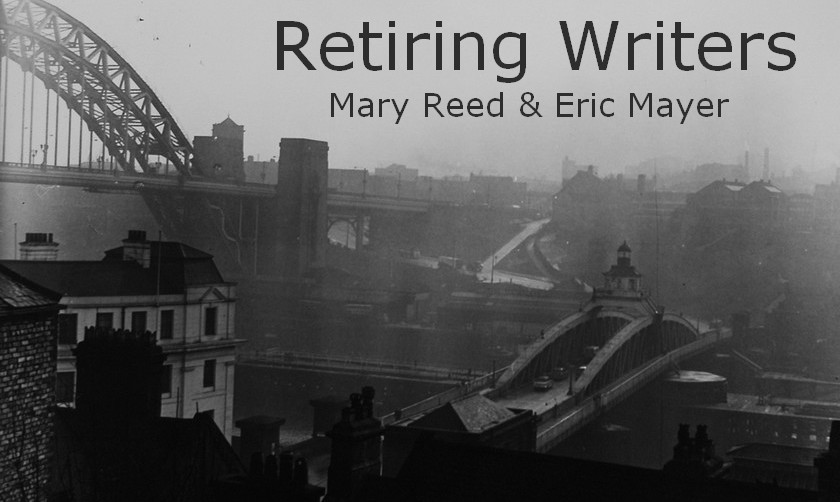Astute readers of this newsletter -- and what mystery reader is not astute? -- will deduce from subtle clues herein that whereas I am American, Mary is British. The clues I am speaking of are spelling conventions such as the telltale 'u' those of the British persuasion insert into certain words. As an American I eschew the 'u'.
Take for example the following quote from one of Mary's essays: "Our window looked out over the grimy industrial city of Newcastle-upon-Tyne, where grass and open spaces were uncommon. Uncommon, that is, unless you counted weedy World War II bomb sites coloured seasonally by the ruby of rosebay willow herb and dusty yellow coltsfoot..."
Did you spot the clue? The spelling of 'coloured'? A sure sign that Mary is from England, for those sharp enough to notice such clues thanks to years of perusing whodunits.
Of course, Mary would have doubled the 'n' in the previous sentence and written "whodunnits" just as she would have rendered 'traveling' as 'travelling'. I'm not sure how the British came to use all those surplus letters. I suppose when your empire spans most the world what's an extra 'u' or 'l'? I wonder how much more all those doubled letters and the occasional 'u' would have earned a British pulp writer at three cents a word? Or would that be 'pence'?
We have to cope with plenty of differences between American English and English English. I'm used to checking the 'mail' while Mary looks at her 'post' except when she says, "What's in the mail? Oops did I say 'mail'? Wash my mouth out!" Then again, for some strange reason, Americans get their mail at post offices' rather than 'mail offices' and the British refer to 'email' and not 'epost'. I'm sure there's a reason but I flunked linguistics in college.
Mary also insists cars have 'bonnets' rather than 'hoods'. Clearly she doesn't know this country very well. The hulking great manly SUVs Americans drive would not be caught dead with bonnets. I believe SUVs with bonnets are actually illegal in Tennessee.
Over the years I have picked up some British words, which can lead to confusion. At the grocery checkout not long ago I asked the clerk if she would double bag my tins. (Bags keep getting thinner. Eventually stores will just make do with the idea of a bag rather than a bag itself). At the mention of tins the clerk abruptly stopped scanning and stared at me with a puzzled look. "Double bag the tins, please," I repeated. The look went from puzzlement to utter incomprehension.
Then it hit me, like a sudden bong from Big Ben.
"Umm...cans. Would you double bag my cans? My wife's from England. They call cans 'tins' over there."
I remembered not to ask her to put the loo rolls in a bag.
Well, Mary and I have been married for thirty-one years so I was bound to add a few Briticisms to my vocabulary. It's been worth it. Even if she does talk funny once in awhile she's still a canny lass.
'Canny' by the way means nice or good. Mary's a Geordie from Newcastle, known as the Toon, where ears are lugs, mud is clarts, clamming means you're hungry, and people say they're gannen (going) eeyem (home).
And this isn't even mentioning the weird way Geordies pronounce their vowels or their glo'al stops. Mary recalls that her budgie would pronounce the only word he learned to speak (his name) as Pe-er.
But I don't want to get into that. It's another dialect altogether.Just thinking about it is bringing tears to my eyes. I better end this before I start bubbling.

No comments:
Post a Comment